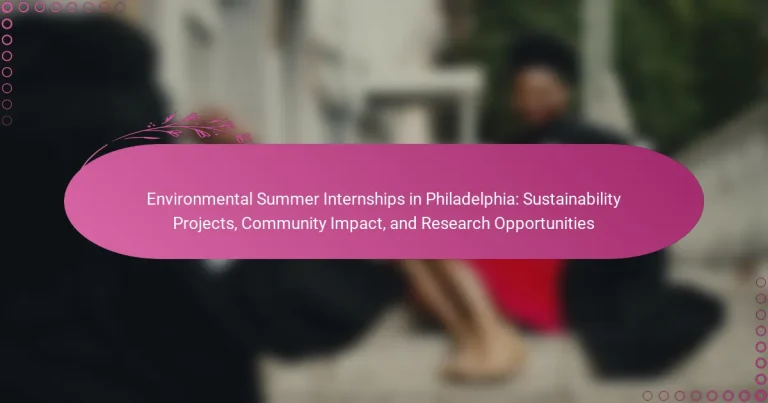

What are Non-Profit Summer Internships in Philadelphia?
Non-profit summer internships in Philadelphia are programs designed for students or recent graduates to gain experience in the non-profit sector. These internships typically involve working with organizations that focus on social, environmental, or community issues. Interns often assist with program development, outreach, and administrative tasks.
In Philadelphia, many non-profits offer structured internship programs. These programs can last from a few weeks to several months during the summer. Interns may receive academic credit or stipends for their work.
According to a report by the National Council of Nonprofits, internships in this sector can enhance career prospects by providing valuable skills and networking opportunities. Non-profit internships also allow individuals to contribute to meaningful causes while developing professional competencies.
How do Non-Profit Summer Internships differ from traditional internships?
Non-profit summer internships differ from traditional internships primarily in their focus on social impact rather than profit generation. Non-profit internships often emphasize community service and social responsibility. Interns in these roles typically engage in mission-driven projects that aim to address societal issues. In contrast, traditional internships may prioritize corporate goals and profit maximization. Non-profit internships often provide opportunities for hands-on experience in advocacy, outreach, and program development. Additionally, compensation in non-profit internships may be lower or non-existent compared to the often higher pay in traditional internships. According to the National Association of Colleges and Employers, 60% of traditional internships offer pay, while many non-profit internships are unpaid or offer stipends.
What types of organizations offer Non-Profit Summer Internships?
Non-profit summer internships are offered by various types of organizations. These include charitable foundations, community service organizations, and educational institutions. Additionally, environmental groups and health-focused non-profits also provide such internships. Arts and cultural organizations frequently seek interns as well. Social justice and advocacy groups are also common providers of non-profit summer internships. These organizations aim to engage students in meaningful work while supporting their missions.
What are the common goals of Non-Profit Summer Internships?
Common goals of non-profit summer internships include skill development, networking opportunities, and practical experience in the non-profit sector. Interns aim to enhance their professional skills, such as communication and project management. They also seek to build relationships with professionals in the field. Gaining hands-on experience in non-profit operations is another key objective. Interns often work on specific projects that contribute to the organization’s mission. This involvement helps interns understand the impact of non-profits on communities. Moreover, internships can lead to future employment opportunities within the sector. These goals align with the overall mission of non-profits to educate and empower future leaders.
Why are Non-Profit Summer Internships important for students?
Non-profit summer internships are important for students because they provide valuable hands-on experience in community service and social impact. These internships allow students to apply academic knowledge in real-world settings. They foster the development of essential skills such as teamwork, communication, and problem-solving. Research indicates that 70% of interns report improved employability after completing internships. Additionally, non-profit internships often enhance students’ understanding of social issues and civic responsibility. This exposure can lead to a lifelong commitment to community engagement and advocacy. Overall, non-profit summer internships prepare students for future careers while contributing positively to society.
What skills can students gain from Non-Profit Summer Internships?
Students can gain various skills from Non-Profit Summer Internships. These skills include project management, communication, and teamwork. Students learn to plan, execute, and evaluate community projects. Effective communication is developed through interactions with diverse stakeholders. Teamwork skills are enhanced by collaborating with peers and supervisors. Additionally, students gain problem-solving abilities by addressing real-world challenges. Leadership skills can also be cultivated through taking initiative in projects. Research skills are improved by gathering data to support non-profit initiatives. Overall, these internships provide practical experience essential for future careers.
How do these internships contribute to community development?
Internships in non-profit organizations contribute to community development by providing essential services and support. They help address local issues such as education, health, and poverty. Interns often engage in community outreach programs, enhancing public awareness and participation. They also assist in project implementation, directly impacting the lives of community members. Furthermore, these internships foster skill development among participants, enabling them to contribute effectively to future community initiatives. Research shows that community-based internships can increase civic engagement and social responsibility among young adults. This involvement leads to stronger community ties and improved social cohesion.

What roles do interns typically take on in Non-Profit Summer Internships?
Interns in non-profit summer internships typically take on roles that support the organization’s mission. Common roles include program assistance, where interns help with project implementation and coordination. They may also engage in outreach activities, promoting programs to the community. Administrative tasks, such as data entry and organizing files, are often assigned to interns as well. Some interns may assist in fundraising efforts, helping to organize events or reach out to potential donors. Research roles are also common, where interns gather data to support the organization’s initiatives. Additionally, interns might participate in volunteer management, coordinating and supporting volunteers. These roles provide practical experience while contributing to the organization’s goals.
What are the most common positions available in these internships?
The most common positions available in non-profit summer internships in Philadelphia include program assistant, communications intern, and development intern. Program assistants typically support project management and administrative tasks. Communications interns focus on social media, content creation, and outreach efforts. Development interns often assist with fundraising initiatives and donor relations. These roles are prevalent due to the operational needs of non-profit organizations. According to a survey by the Nonprofit Leadership Alliance, 60% of non-profit internships fall into these categories, highlighting their significance in the sector.
What responsibilities do interns have in program management roles?
Interns in program management roles are responsible for assisting with project coordination. They help track project timelines and ensure deadlines are met. Interns also participate in meetings to gather updates from team members. They may assist in preparing reports and presentations for stakeholders. Tasks often include data entry and maintaining project documentation. Interns are expected to communicate effectively with team members and external partners. They also conduct research to support program initiatives. These responsibilities help interns develop skills in organization and communication within a professional setting.
How do interns contribute to fundraising efforts?
Interns contribute to fundraising efforts by assisting with campaign planning and execution. They help identify potential donors through research. Interns often manage social media campaigns to promote fundraising events. They may also participate in organizing events that raise funds. Their roles include data entry and tracking donations. Interns can help create promotional materials for fundraising initiatives. They often engage with the community to raise awareness about the organization’s mission. Their fresh perspectives can lead to innovative fundraising ideas.
What are the challenges interns face in Non-Profit Summer Internships?
Interns in non-profit summer internships face several challenges. Limited funding often results in fewer resources and support. Many non-profits operate with tight budgets, which can lead to inadequate training. Interns may also encounter a lack of structured mentorship. This can hinder their professional development and learning opportunities. Additionally, interns often juggle multiple responsibilities. This can lead to feelings of being overwhelmed. The emotional toll of working on social issues can also be significant. Interns may experience burnout due to the demanding nature of non-profit work. Lastly, networking opportunities can be limited in smaller organizations. This can affect their future career prospects.
How can interns overcome common obstacles in these roles?
Interns can overcome common obstacles by seeking guidance and feedback from supervisors. Regular communication helps clarify expectations and reduces confusion. Building a support network with fellow interns can provide emotional support and shared resources. Time management skills are essential for balancing multiple tasks effectively. Setting clear priorities allows interns to focus on high-impact activities. Additionally, interns should actively participate in training sessions to enhance their skills. Engaging in self-reflection can help identify personal strengths and areas for improvement. Research shows that interns who seek mentorship are more likely to succeed in their roles.
What support systems are in place for interns in Philadelphia?
Interns in Philadelphia benefit from various support systems. These include mentorship programs that pair interns with experienced professionals. Many organizations offer training sessions to enhance skills relevant to their roles. Interns also have access to networking events that connect them with industry leaders. Additionally, some programs provide stipends or financial support to alleviate living expenses. Resources such as workshops on resume building and interview preparation are commonly available. Feedback mechanisms are often in place to ensure interns receive constructive evaluations. Overall, these support systems aim to foster a positive and enriching internship experience.

What skills are developed through Non-Profit Summer Internships?
Non-Profit Summer Internships develop essential skills such as communication, teamwork, and project management. Interns enhance their communication skills by interacting with diverse stakeholders. They learn to collaborate effectively within teams to achieve common goals. Project management skills are cultivated through organizing events and managing timelines. Additionally, interns gain problem-solving abilities by addressing real-world challenges faced by non-profits. They also develop cultural competency by working with various communities. Research indicates that 85% of interns report improved professional skills after completing internships. These experiences prepare interns for future careers in various fields.
How do Non-Profit Summer Internships enhance professional skills?
Non-profit summer internships enhance professional skills by providing hands-on experience in various roles. Interns often engage in project management, which develops organizational and leadership abilities. They also work in team settings, fostering collaboration and communication skills. Additionally, these internships often involve direct interaction with community members, enhancing interpersonal skills. Interns may also learn to adapt to diverse challenges, improving problem-solving capabilities. According to a study by the National Association of Colleges and Employers, 70% of employers prefer candidates with internship experience. This indicates the value of practical skills gained through non-profit internships. Overall, these experiences prepare interns for future career opportunities by equipping them with essential professional competencies.
What soft skills are emphasized during these internships?
Soft skills emphasized during these internships include communication, teamwork, and problem-solving. Effective communication is crucial for collaborating with diverse teams and stakeholders. Teamwork fosters a collaborative environment essential for achieving organizational goals. Problem-solving skills are necessary for addressing challenges in a non-profit setting. Additionally, adaptability and time management are important for navigating dynamic work environments. Research shows that internships focusing on these skills enhance employability and career readiness. According to a study by the National Association of Colleges and Employers, 73% of employers value communication skills in job candidates.
How do technical skills play a role in Non-Profit Summer Internships?
Technical skills are crucial in Non-Profit Summer Internships. They enhance the efficiency and effectiveness of tasks. Interns utilize skills like data analysis, social media management, and graphic design. These skills help organizations streamline operations and improve outreach. For example, interns with data analysis skills can assess program effectiveness. This leads to informed decision-making and resource allocation. Additionally, social media skills boost engagement and visibility for non-profits. According to a study by the Nonprofit Technology Network, 70% of non-profits report needing technology skills in their workforce. This highlights the demand for technical proficiency in the sector.
What are the long-term benefits of skills gained from Non-Profit Summer Internships?
Non-Profit Summer Internships provide long-term benefits through skill development that enhances career prospects. Interns gain valuable experience in project management, communication, and teamwork. These skills are highly transferable across various industries. Research indicates that 70% of interns reported improved job readiness after such experiences. Additionally, networking opportunities with professionals can lead to future job placements. Interns often develop a strong sense of social responsibility, which is increasingly valued by employers. Overall, the skills gained contribute to personal growth and professional advancement.
How do these skills impact future career opportunities?
Skills developed during non-profit summer internships significantly enhance future career opportunities. These skills include teamwork, communication, and problem-solving. Employers value these competencies highly. According to a survey by the National Association of Colleges and Employers, 74% of employers seek candidates with strong teamwork skills. Additionally, internships provide real-world experience that differentiates candidates in the job market. This hands-on experience can lead to better job placements and higher starting salaries. Therefore, the skills gained from non-profit internships directly correlate with improved career prospects.
What networking opportunities arise from Non-Profit Summer Internships?
Non-Profit Summer Internships provide numerous networking opportunities. Interns connect with professionals in the non-profit sector. This includes direct interaction with organization leaders and staff. Interns often attend meetings, workshops, and community events. These settings facilitate relationship-building with peers and mentors. Networking can lead to job offers after graduation. According to a study by the National Association of Colleges and Employers, 70% of internships lead to full-time employment. Interns also gain access to alumni networks and professional associations. These connections can be valuable for future career prospects.
What practical tips can enhance the Non-Profit Summer Internship experience?
Engaging actively in the Non-Profit Summer Internship enhances the experience significantly. Interns should seek out meaningful projects that align with their interests. This involvement fosters personal investment and skill development. Networking within the organization is crucial. Building relationships can lead to mentorship opportunities. Regular feedback from supervisors helps interns improve and adapt. Setting personal goals provides focus and direction throughout the internship. Participating in team meetings allows interns to understand organizational dynamics. Documenting experiences and skills gained can aid in future job searches. These strategies collectively enrich the internship experience in a non-profit setting.
Non-profit summer internships in Philadelphia provide students and recent graduates with valuable experience in the non-profit sector, focusing on social, environmental, and community issues. These internships typically involve roles such as program assistance, communications, and development, allowing interns to develop essential skills like project management, communication, and teamwork. The article also highlights the differences between non-profit and traditional internships, the types of organizations offering these opportunities, and the common challenges interns face. Additionally, it discusses the long-term benefits of skills gained through these internships and the networking opportunities that can enhance future career prospects.






